Real Whirling Dervish Ceremony Only Thursdays
In Silivrikapi Fatih Istanbul
Whirling Dervish Ceremony Real Monastery in Fatih Every Thursday @ 20:00 pm
Duration: 120 Minutes (Approx.) Because. it is Not a Touristic Show, Durations Are Flexible.
Location: Silivrikapi Fatih / ISTANBUL
The Ceremony is in a Real Monastery on Thursday Evenings with Zikr and Sufi Music
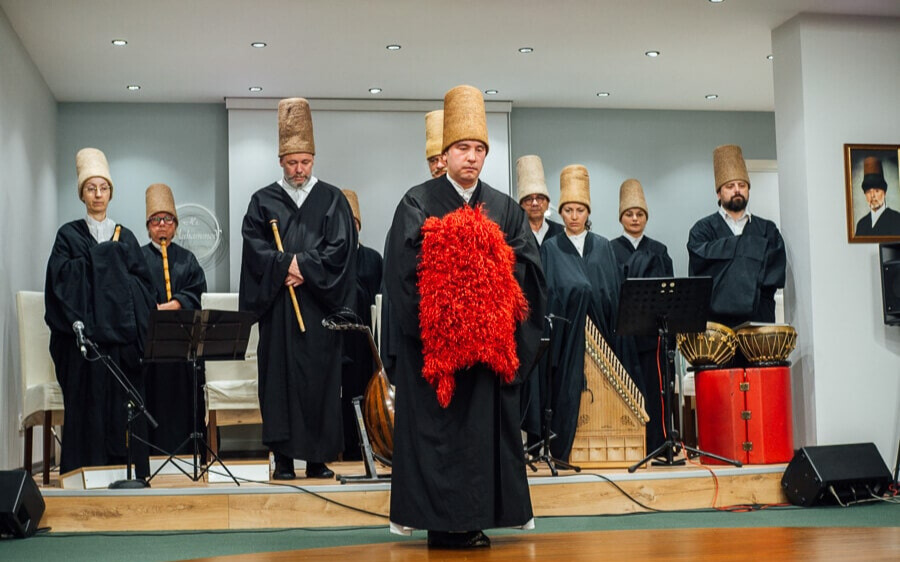
Our Programme ;
* Previously Recorded Video Discussion About Mevlewi’s Path with English Subtitle.
it is Between At 19.30 Pm – 21.00 Pm (If you are Interested).
*Mevlevi Dhikr At 21.00pm – 21.30 Pm.
*Serving Dervish Food At 21:30 Pm – 21.45 Pm.
*Sema Ceremony at 21.45 Pm – 22.30 Pm.
Dress Code : As a Tolerans House of Rumi There is No any Dress Code. You may participate as you want.
Photography : Yes you can take Photo and Video .
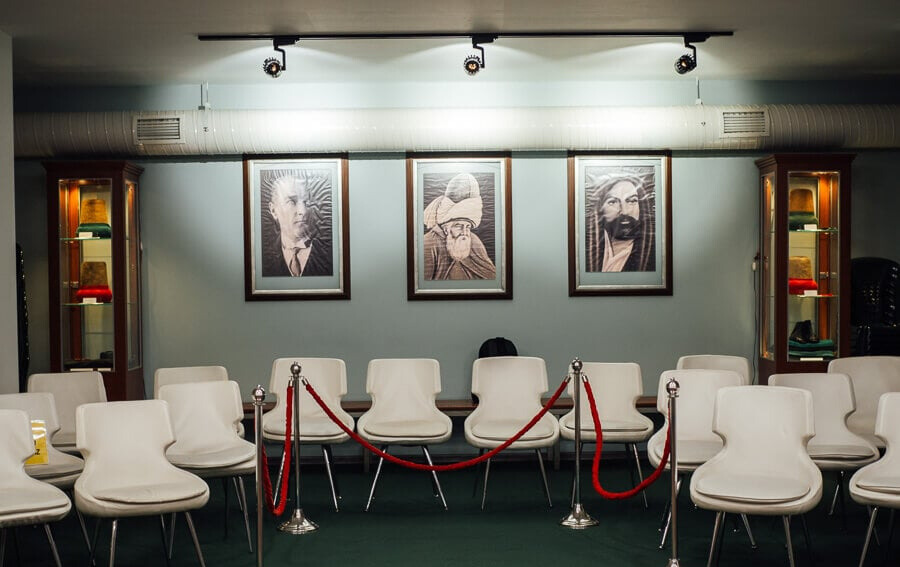
( Kind Attention! ) Amateur Photograpy is Acceptable but Professional Ones Are Forbidden Based on Copyright Laws. Please Contact us If you want Professional Photography / Videography )
** Please Note that There May be a Little Time Changes and Flexibility on the Ceremony Due to the Prayer Hours.
** Also We are Taking Limited Number of Guests to the Monastery in Order Not to Disturb the Ambiance.
Known to the West as Whirling Dervishes, the Mevlevi Order was Founded by Mevlana Rumi in the 13th century. The Order wrote of tolerance, forgiveness, and enlightenment. They survive today as a cultural brotherhood. They are not theatrical spectacles but sacred rituals. The ritual of the Mevlevi sect, known as the sema, is a serious religious ritual performed by Muslim priests in a prayer trance to Allah.
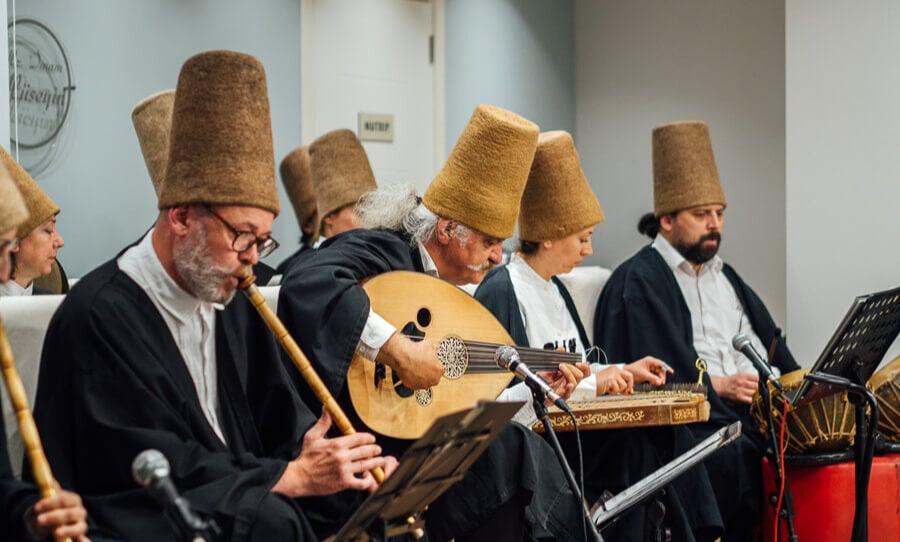
Sufi Culture & Whirling Dervish Ceremony in a Real Monastery
Real Whirling Dervish Ceremony Only Thursdays
Known to the west as Whirling Dervishes, the Mevlevi Order was Founded by Mevlana Rumi in the 13th Century. The Order wrote of Tolerance, Forgiveness, and Enlightenment.
They survive today as a Cultural Brotherhood. They are not Theatrical spectacles but sacred rituals. The ritual of the Mevlevi sect, known as the sema, is a serious religious ritual performed by Muslim priests in a prayer trance to Allah.
Mevlevi believed that During the sema the soul was released from earthly ties, and able to freely and jubilantly commune with the divine. Dervish literally means “doorway” and is thought to be an entrance from this material world to the spiritual, heavenly world. The Whirling Dervishes played an important part in the evolution of Ottoman High Culture.
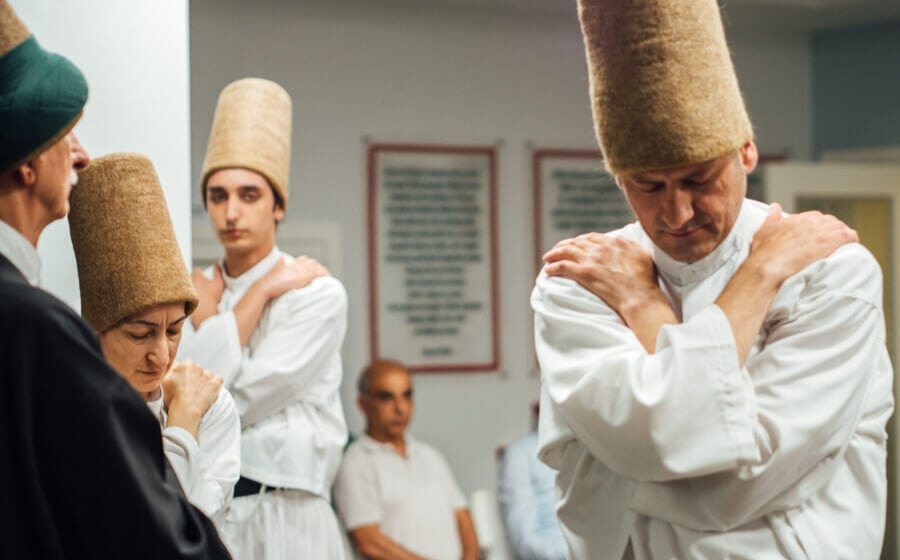
From the Fourteenth to the Twentieth Century, their impact on Classical poetry, calligraphy and visual arts was profound. Rumi and his followers integrated music into their rituals as an article of Faith. Rumi emphasized that music uplifts our spirit to realms above, and we hear the tunes of the Gates of Paradise.
The ceremony is in a Real Monastery on Thursday Evenings at 21:00 PM
THINGS TO KNOW BEFORE YOU GO ;
Because This Ceremony is held in a mosque, There is a Particular Dress Code to Follow:
Visitors Should Wear Long Sleeves and Long Pants or a Flowing Skirt. You do not need to Cover your hair, but you do need to remove your Shoes at the door.
Photography (Without Flash) and Filming are Permitted, as long as you take care not to Disturb the Dervishes or Other Audience Members.
Bring Some Cash if you want to support EMAV by Purchasing a Book or CD.
Contact Name : Uğur Şengüler – Eren Tanık
Instagram : https://www.instagram.com/istanbullifeorg
Whatsapp : +905057093384 – 05421063383
E-mail : info@istanbullife.org ( 24/7 Online )

Russian Language ;
Церемония Кружащихся дервишей в настоящем суфийском монастыре Стамбула.
Суфийская Культура и Церемония Кружащихся дервишей в настоящем текке (обитель дервишей)
Идея: во время этой церемонии посещения текке (монастыря дервишей) вы узнаете историю суфизма и суфийских общин в Стамбуле, а также познакомитесь с радицией суфийского ордена Мевлеви в современной Турции. Вы встретитесь с членами суфийской общины и их шейхом, послушаете их музыку, станете свидетелем Сема – церемонии Кружащихся Дервишей. Церемонии проходят по четвергам.
Церемония проходит в настоящем текке в четверг вечером
Время встречи 20: 00 в нашей художественной галерее, расположенной в районе Султанахмет !
Как можно принять участие?
Вы можете отправить заявку на посещение церемонии, позвонив нам
( +90 505 709 33 84 ) Uğur ŞENGÜLER или по электронной почте: E-MAIL
Адрес галереи и места встречи участников : https://istanbullife.org/about-us/
Turkish Language ;
İstanbul’da gerçek bir Sufi tekkesinde Semazen Töreni.
Gerçek bir tekkede Sufi Kültürü ve Semazen Töreni
Fikir: Bir tekkeyi ziyaret edeceğiniz bu tören sırasında, İstanbul’daki Sufizm ve Sufi topluluklarının tarihini öğrenecek ve modern Türkiye’deki Mevlevi Sufi tarikatının radiyası hakkında bilgi edineceksiniz. Sufi cemaatinin üyeleri ve şeyhleriyle tanışacak, müziklerini dinleyecek ve Semazenlerin töreni olan Sema’ya tanık olacaksınız. Törenler Perşembe günleri gerçekleşmektedir.
Tören Perşembe akşamı otantik bir tekkede gerçekleşmektedir
Buluşma saati 20:00 Sultanahmet mahallesinde bulunan sanat galerimizde!
Nasıl katılabilirim?
Bizi arayarak törene katılmak için talep gönderebilirsiniz
( +90 505 709 33 84) Uğur ŞENGÜLER veya e-posta ile: E-POSTA
Galerinin adresi ve katılımcıların buluşma yeri : https://istanbullife.org/about-us/
French Language ;
Cérémonie du derviche tourneur dans un véritable monastère soufi à Istanbul.
Culture soufie et cérémonie du derviche tourneur dans un véritable tekke (monastère derviche)
Idée : Au cours de cette cérémonie de visite d’un tekke (monastère de derviches), vous découvrirez l’histoire du soufisme et des communautés soufies à Istanbul, ainsi que la radiyya de l’ordre soufi Mevlevi dans la Turquie d’aujourd’hui. Vous rencontrerez des membres de la communauté soufie et leur cheikh, écouterez leur musique et assisterez à la Sema, la cérémonie des derviches tourneurs. Les cérémonies ont lieu le jeudi.
La cérémonie se déroule dans une tekkah authentique le jeudi soir.
Le rendez-vous est fixé à 20h00 dans notre galerie d’art située dans le quartier de Sultanahmet !
Comment puis-je participer ?
Vous pouvez envoyer une demande de participation à la cérémonie en nous appelant au
Adresse de la galerie et lieu de rencontre des participants : https://istanbullife.org/about-us/
Spanish Language ;
Ceremonia de los Derviches Remolinos en un auténtico monasterio sufí en Estambul.
Cultura sufí y ceremonia de los derviches giradores en un auténtico tekke (monasterio derviche)
Idea: Durante esta ceremonia de visita a un tekke (monasterio derviche), conocerá la historia del sufismo y las comunidades sufíes de Estambul, así como la radiyya de la orden sufí Mevlevi en la Turquía moderna. Conocerá a miembros de la comunidad sufí y a su jeque, escuchará su música y presenciará la Sema, la ceremonia de los derviches giradores. Las ceremonias tienen lugar los jueves.
La ceremonia se celebra el jueves por la noche en una auténtica tekkah.
La cita es a las 20:00 en nuestra galería de arte situada en el barrio de Sultanahmet.
¿Cómo puedo participar?
Puede enviar una solicitud para asistir a la ceremonia llamándonos al
Dirección de la galería y lugar de encuentro de los participantes : https://istanbullife.org/about-us/
Chinese Language ;
舞者脱去黑衣意味着摆脱凡尘 ,留下的黑带,象征自己的肉体,白褂和白裙代表真主,土黄色的高帽子象征墓碑。土耳其旋转舞不仅仅是舞蹈,更是一种宗教仪式。
苏菲教派认为万物都是旋转的,人从出生至去世,都是一个循环,都是一种旋转,于是,他们通过旋转这种舞蹈形式与宇宙和神达成沟通和接触,这种形式被称为“梅夫拉维祭拜仪式”,或“旋转舞仪式”,是一种优雅的灵魂出窍的舞蹈仪式。
提到旋转舞,就不得不提到土耳其旋转舞的创始人杰拉尔丁·鲁米,鲁米是土耳其最伟大的神秘主义哲学家之一,是梅夫拉维教派重要的先知梅乌拉那(意为“我们的导师”)。据称苦修中的鲁米,当年在土耳其的中部城市科尼亚定居时,因听到铁匠铺的敲击声,而感受到了某种神秘力量,情不自禁地旋转起来没有停歇,感受到了与宇宙与安拉的对话。他去世后,他的儿子把他的信徒们组织成一个教徒会,称为梅夫拉维,或旋转托钵僧。
Italian Language ;
Cerimonia dei dervisci vorticosi in un vero monastero sufi a Istanbul.
Cultura sufi e cerimonia dei dervisci rotanti in un vero tekke (monastero derviscio)
Idea: durante questa cerimonia di visita a un tekke (monastero derviscio), imparerete la storia del sufismo e delle comunità sufi a Istanbul, oltre a conoscere la radiyya dell’ordine sufi Mevlevi nella Turchia moderna. Incontrerete i membri della comunità sufi e il loro sceicco, ascolterete la loro musica e assisterete al Sema, la cerimonia dei dervisci rotanti. Le cerimonie hanno luogo il giovedì.
La cerimonia si svolge in un’autentica tekkah il giovedì sera.
L’orario di ritrovo è alle 20:00 nella nostra galleria d’arte situata nel quartiere di Sultanahmet!
Come posso partecipare?
Potete inviare una richiesta di partecipazione alla cerimonia chiamandoci al numero
Indirizzo della galleria e luogo di incontro dei partecipanti: https://istanbullife.org/about-us/
Japanese Language ;
イスタンブールの本物のスーフィー僧院での旋回ダルヴィッシュ儀式。
本物のテッケ(ダルビッシュ僧院)でのスーフィー文化と旋回ダルビッシュの儀式
アイデア:テッケ(ダルヴィーシュ僧院)を訪問するこの儀式では、イスタンブールのスーフィズムとスーフィー・コミュニティの歴史を学び、現代トルコにおけるメヴレヴィー・スーフィー教団のラーディヤについて学ぶ。スーフィー・コミュニティーのメンバーや首長に会い、彼らの音楽を聴き、セマ(旋回するダーヴィッシュの儀式)を見学する。儀式は木曜日に行われる。
セレモニーは木曜日の夕方、本格的なテッカで行われます。
集合時間は20:00で、スルタンアフメット地区にあるアートギャラリーです!
どうすれば参加できますか?
セレモニーへの参加希望は、下記までお電話ください。
ギャラリーの住所と参加者の集合場所 : https://istanbullife.org/about-us/
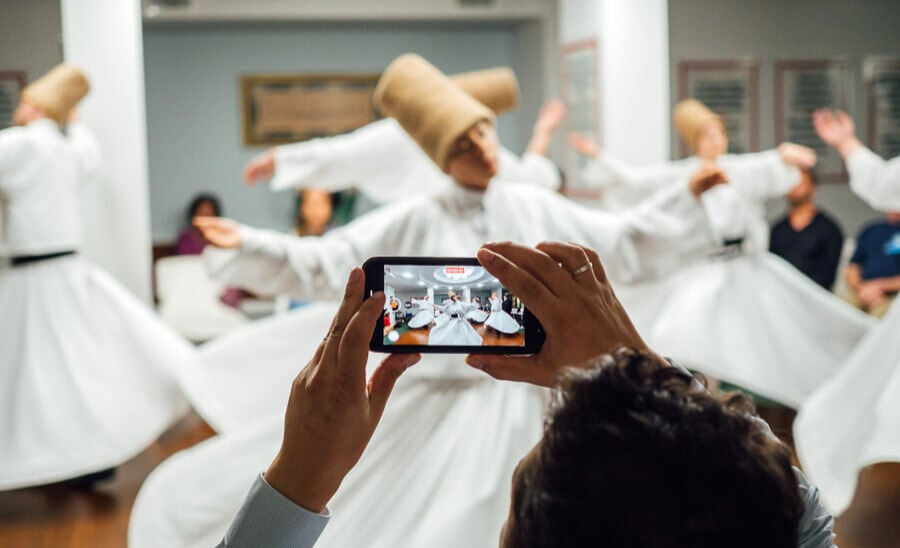
Who is Mevlana Celaleddin Rumi ?
Mevlana Celaddiin-i Rumi is a 13th century Muslim saint and Anatolian mystic known throughout the world for his exquisite poems and words of wisdom, which have been translated into many languages. Rumi, as he is known in the west, is the best selling poet in USA. The United Nations declared 2007 The Year of Rumi and celebrations were held world wide.
Mevlana was a Muslim, but not an orthodox type. His doctrine advocates unlimited tolerance, positive reasoning, goodness, charity and awareness through love. To him all religions were more or less truth. Mevlana looked with the same eye on Muslim, Jew and Christian alike. His peaceful and tolerant teachings have appealed to men of all sects and creeds. In 1958, Pope John XXIII wrote a special message saying: “In the name of the Catholic World, I bow with respect before the memory of Rumi.”
Mevlana died on 17 December 1273 and was laid to rest beside his father in Konya, in present day Turkey. A splendid shrine, the Mevlana Moseleum was erected over their remains, which is now a museum and place of pilgrimage. Every year on that day, at this magnificient 13th century mausoleum we celebrate Seb-i Arus, his ‘Wedding Day’, together with thousands of people from all around the world.
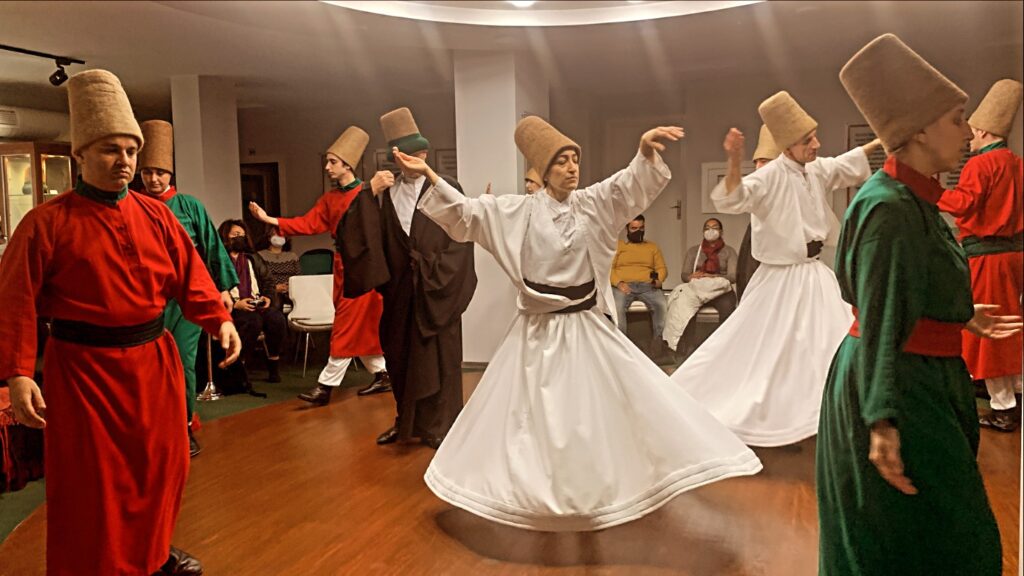
Works of Mevlana
In addition to his best-known book of verse, Masnawi, the first eighteen lines of which were written down personally and the rest dictated to his student, Chalabi Husameddin, he also wrote Divan-i Kebir; Fih-i Ma-Fi, Mecalis- i Seb’a and Mektubat.
Masnawi
It contains 26 thousand couplets in six volumes, consisting of stories inspired by the Quran’s teachings about all that is created, as well as Hz. Mohammad’s words and their morals.
Divan-i Kebir
Preceding Masnawi, it is a collection of poems recited by Hz. Mevlana over a wide span of time. It contains approximately 40 thousand couplets within twenty-one moderate-size divans, as well as one “Divan-i Rubai”
Fih-i Ma-Fih
It connotes “What’s within is within” and contains Hz. Mevlana’s lectures. Mecalis-i Seb’a: As the meaning of the title “Seven Sermons” implies, it contains Hz. Mevlana’s seven lectures.
Mektubat
It consists of the 147 letters Hz. Mevlana wrote to relatives, including his son Sultan Veled, and to friends, rulers, and officials of the State.
The daily language of the time was Turkish, the scientific language was Arabic, while Persian was the language of literature. For this reason Hz Mevlana’s books are all in Persian. They were all translated into Turkish at a later time.
In his books, Hz. Mevlana talks about how to be a wholesome human being: one who has inner peace and harmony, one who is both aware of and appreciates God’s blessings, one who takes a stand in the face of life’s hardships, one who is tolerant and loving.
An example of Hz. Mevlana’s advice to his son, Bahaddin Veled, to indicate his spiritual and worldy viewpoints is in the next column. More than seven hundred years have elapsed since the day of this advice and it still holds true for us all…
Abstract of my life are these words: Raw I was, Cooked well, Burnt I got.
Hz. Mevlana, who summed up life in the above words, passed away on 17 December 1273 following a brief time on his sickbed and reached out to his Allah and his beloved prophet. Mevlevi disciples call this night Seb-i Arus (wedding night), the night of unity.
We would like to conclude our words with the following advice from Mevlana to those who aspire to the pursuit of truth, even today:
Mevlana Celaleddin Rumi / Written by Hasan Dede
First , here is one way in which he describe himself.
My Mother is Love
My Father is Love
My Prophet is Love
My God is Love
I am a child of Love
I have come only to speak of Love .
Born in the City of Balkh in Afghanistan , Mevlana lived most of his life in Konya , seat of the Seljuk Empire , located in present day Turkiye . The son and heir to the position of a noted Theologian and Mystic , Mevlana was jarred out of his comfortable ways and beliefs by a mysterious dervish named Shems of Tebriz . The moment of the meeting of Mevlana and Shems is referred to as the ‘meeting of two seas’ . Each of them had attained a spiritual awareness of depth and breadth which distinguished them from others . Now these two would complete each other in the boundless Sea of Unity .
Shems’ way of attracting Mevlana’s attention was by asking whether the Prophet Mohammed or the Mystic Beyazid-i Bestami was greater. This was a rather shocking question, but Mevlana without hesitation replied that of course, the Prophet is the greater of the two. At this Shems’ fiery manner softened a little. Then he continued , ” But Lord Mohammed said, ‘God! I glorify You. We do not know Your worth.’ Whereas Beyazid-i Bestami said, ‘I glorify myself, my reputation is great because there is no Being but God in every particle of my body.’ How can you explain this? ” Mevlana had anticipated this, and replied immediately, “The Lord Mohammed spoke these words because each day he progressed many stages forward; and each time he reached a new level of understanding, he begged God’s forgiveness for his previous knowledge and errors. The Prophet had the endurance to contemplate God in abstraction, purified of all else, in all His manifestations, without remaining at any one stage of judgement. But Bestami was carried away by his arrival at the very first stage and, having been intoxicated by this attainment, got no further…”
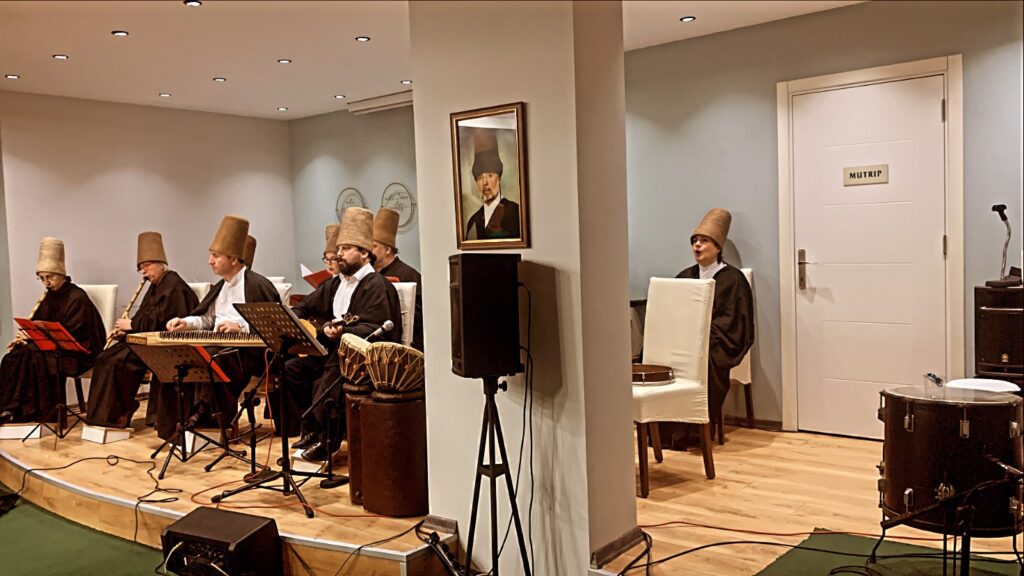
Overwhelmed by the profundity of this answer, Shems fell to the ground senseless. After Mevlana helped him up, they embraced as long lost lovers and without a word, set out arm in arm for Mevlana’s house at medrese. The townsfolk looked on in confusion and astonishment as their dignified Mevlana walked away with this disheveled strange dervish.
It was Shems who kindled the spark of passion for the Divine in Mevlana. Mevlana’s whole life of book learning, canonical views, and conservative behavior changed radically as the burning of Divine Love swept through him. A steady husband and father, Mevlana had taught in the medrese (a center of learning similar to a university of the time), given judgements on religious matters, and drawn a following. Now he was completely absorbed with Shems, stayed in seclusion with him for months, and humbled himself in his attempt to meet his every wish.
Mevlana’s students and disciples couldn’t bear to see this person they held in such high esteem submitting himself to an unknown, aging dervish who was uninterested in endearing himself to anyone except Mevlana. Soon their displeasure turned to actual threats against Shems, and one day he disappeared. Because those followers were unable to comprehend the meaning and depth of the relationship between Mevlana and Shems, they were unprepared for Mevlana’s reaction to Shems’ disappearance. Instead of returning to his former ways and relationships, Mevlana became crazed with longing and spent days and nights whirling in the Sema (2) that Shems had given him a taste for, and feverishly reciting love poems that sprang from the anguish and longing within him.
When it was learned that Shems was in Damascus, Mevlana’s oldest son Sultan Veled set out to try to bring him back. Now Mevlana was overcome with anticipation–He was returning! The one who had revealed to him Divine Love in man ! The on who had brought him to Divine Love! The one who had become Divine Love! Poetry, music, Sema ecstasy!
And for some time after Shems’ return things went well. The malcontents were remorseful and on their best behavior , Mevlana gave a young woman of his household to Shems in marriage , and the loving relationship between Shems and Mevlana reached new depths as Mevlana matured in this Sea of the Divine .
The distinction between lover and beloved was being obliterated . In response to Sultan Veled’s asking Shems to give him what he had given to Mevlana , Shems replied that nothing of himself , no Shems , existed any longer . He told Veled that he could find Shems only in Mevlana now . As for Mevlana , through his poems we see him losing his individual identity and acknowledging Shems as the embodiment of the Divine in which he had ‘drowned’ .
But things were not to continue like this for long . Shems’ young wife died rather suddenly and the former agitators used this as an excuse to openly disparage Shems , and actually threatened his life , saying the young woman had been unable to bear such a husband and had pined away in sadness . Their menacing became bolder until one night when Shems left the room where he was chatting with Mevlana and stepped outside in response to a call , the threats were brought to realization . Nothing was found of Shems but a few drops of blood on the threshold . Though Mevlana searched for Shems as at his first disappearance , this time there was to be no delivery from the loss .
One time they had asked Mevlana to describe his life and he replied , ” I was raw . I cooked . I burned . ” Now was the time of burning , of reaching total unity , of realizing Shems within himself . They were not two individuals but rather two bodies with one soul . The longing , the anguish that Mevlana was living were essential . Shems was not anywhere but within Mevlana himself ; he had merely been a bodily form presenting to Mevlana the reflection of that Divine within himself .
After a time Mevlana’s extraordinary need for a mirror for his love was met by Sheik Selahaddin ‘ Zarkubi ‘ (Goldsmith) , a former disciple of Seyyid Burhaneddin of Tirmiz ( Mevlana’s early mentor and after his father , the one with the greatest influence on his introduction to spirituality along with knowledge ) .
Mevlana now held Selahaddin up as a sheik to his disciples , as a spiritual model . Again there were complaints and murmuring , this time because of the goldsmith’s lack of formal education . They had not admired Shems , But at least they had realized that he was a well-educated person . Now an illiterate craftsman was being presented to them as their spiritual master . They were unable to perceive the beauty , the greatness , the purity of the true ‘self ‘ of Selahaddin, and thus missed out on the graces possible from his words and example.
No matter. For a time Mevlana found the love born of Shems in the pure face shining with inner light and the truly fervent hearth of Selahaddin. In one poem Mevlana said: Last year he suddenly appeared in a red caftan, his face shining. This year he has come again, wrapped in a gray cloak. He changed his apparel and came… When Mevlana was asked, “Who is a man of wisdom ?”, he answered thus, ” The wise one is he who, when you’re silent, speaks of your inner secrets. That man is Sheik Selahaddin.”
With an awareness that his worldly time was nearing its end, Sheik Selahaddin looked forward to his death; and in the winter of 1258 he was released from the prison of the body and re-united with the Source of all Love in the Divine.
Mevlana had lost first his father Sultanul Ulema Bahaeddin Veled, then Seyyid Burhaneddin, then Shems, and now Sheik Selahaddin. Each lost left its mark and threw Mevlana deeper into the inner world where he burned in spiritual communion. This burning was bringing him ever closer to becoming the Mevlana he was to be.
The calm peacefulness of Sheik Selahaddin was just what Mevlana had needed, but now it was time for a new light to shine for Mevlana, the light which would enable the immortal masterpiece The Mesnevi (Mathnawi) to come into being. This light was Husameddin Chelebi.
Initiated into the beauties of the spiritual path by both Shems and Sheik Selahaddin, Husameddin Chelebi had been participating in the Sema and music assemblies and Mevlana’s discourses for years. He was spiritually matured and ready to bear the great responsibility of taking down the words of Mevlana which whereto flow and become the six volume poem The Mesnevi. In Husameddin Chelebi Mevlana again found the embodiment of Shems. Mevlana’s exuberance now took on a calmness and maturity of thought. Husameddin Chelebi was aware of Mevlana’s mature readiness, and one day suggested that Mevlana produce a work that would encompass his thoughts and ideas in a form that would touch people and be a guide to them in their spiritual seeking. With a smile that sublime Lover of God reached up and took a piece of paper from within the folds of his turban and preferred in to Chelebi to read. It was the first 18 verses of what was to be the Book of Realities, the book revealing secrets unsaid before, The Light offered to man as a help in realizing God, The Mesnevi .
The passionate poems of Love and longing which make up to the Divan-i Kebir are often too wild in their passion, too outrageously uninhibited to be easily tolerated as man speaking to and of his God. So in the six volumes of rhyming couplets of the Mesnevi, Mevlana deliberately set out to write a guide for those seeking the essence of this Divine Love and Passion. Using fables and folk stories, examples of the sacred and the profane, Mevlana interwove hundreds of stories in which the reader could see his own fallible and faults, and also discover to means of abandoning them and taking on the characteristics of the Divine. Time and again Mevlana emphasizes his essential premise of the need for a living guide in the form of a spiritual master… A human being, a Perfect Human Being to lead one to the Divine.
There is another book based on the discourses and the conversations between the master and disciple–Mevlana and Suleyman Pervane. Called Fihi Ma Fih (Discourses of Rumi), it offers in prose style Mevlana’s views on God, heaven and earth, the Universal Intellect and Partial Intellect, and more. It is a controlled and scholarly work, maintaining a dignified pace while The Mesnevi unrestrainedly sweeps along. Different only in style and form, there is nothing contradictory in the three works, The Divani Kebir, The Mesnevi, Fihi Ma Fih . The intellect , the soul and the love of the soul are all satisfied .
Remember the joy , the craziness of your first love ? Puppy love ? Summer Love ? High School Romance ? It doesn’t matter — it was real ! Filling pages in your notebook with ‘ his ‘ name . Hanging out on the corner of ‘ her ‘ street . Playing the same record over and over because you two had first heard it together and it was ‘ your ‘ song… Perhaps the only time of totally unaffected love . Mevlana experienced love of the Divine , love of his Creator , with total exuberance and intoxication. God incarnate in Shems , in Selahaddin , in Chelebi . The passion for God leaves earthly loves far behind , yet Mevlana had this to say , ” All loves lead to the Divine .”
Turning in the Sema and the pouring forth of poetry sprang from the intense passion Mevlana was living . There was nothing static or passive about the love of Mevlana . Times of silent introspection and contemplation interspersed with rapturous activity…He was now Lover , now Beloved , now the very Spirit of Love itself , the Divine manifested as each of these within the human .
The years of fasting and abstinence had taken their toll on Mevlana’s body , and in the fall of 1273 he fell ill . On his deathbed he comforted his family and friends thus , ” Don’t grieve that I am leaving this world . Whatever may happen to you , I am with you . As our Prophet said , ‘ Both my life and my death are auspicious for you .’ The purpose of my life was to show the true path and my death is to aid you along the way . ”
On the evening of 17 December 1273 Mevlana took leave of this mortal world, calling out to God, “When You receive our spirit, death is as sweet as sugar ! When we are with You, death is sweeter than sweet life !”
THE EMINENCE OF THE EXALTED MEVLANA
( From a talk by Hasan Çıkar, 2 Sept. 2001)
Of all the sages, countless saints, and Divinely inspired ones of the past, none elevated the human being or spoke as openly as Mevlana concerning the sublime position of man in the eyes of God.
It’s not possible to find another who expressed his love, Divine Love, this deeply and who offered it to all mankind. From head to foot Mevlana is a monument of humility and a ray of enlightenment not only for the time he lived but for all ages. It is Mevlana’ s mind which thinks and his heart which feels for all people; and his is the way of peace and love.
Love, according to Mevlana: the strongest link in the chain binding humans to life and the ladder that will take them to their Creator. Mevlana, who burned with love of God and of man, wants humans to be useful and of service to those around them.
On this subject he said: Even a candle, when it knows it will melt away, doesn’ t quit spreading its light out. Oh human! You, while completely full of the Power of the Creator, why do you hang back?
Mevlana’s every action and every word from his mouth are full of unity and brotherhood. His words are to all humans and to all humanity. Mevlana, who gave great importance to solidarity between people said that what can assist in this is the gracious behavior seen only in mature people, and explained: If someone isn’t helping others, doesn’ t want others to be happy, and isn’t mature, then that person isn’t a human being.
Mevlana was the King of Hearts who thought of others on every subject, from the greatest matters to minor details; while loving people he was also repairing their hearts, softening their pains, melting away their sorrows, removing their contentions, and purifying them.
Mevlana is the doorway of forgiveness and understanding where faults are washed away and sins are purified. One day they told Mevlana that such and such a person had never sinned. Pursing his lips, Mevlana responded, ” If only he had sinned and later been regretful.”
The princely Exalted Mevlana, who spread fresh hope every moment, was good humored and sweet. He knew how to take everything as a joke. In anger someone was threatening someone else, ” I’ll skin you alive..!” To this Mevlana commented, ” What a good man. Day and night our wish is to remove this skin and be saved from its troubles so we can be reunited with the Mercy of the Friend. If only that fellow would come and save us from the pain of our ‘ skin’”. He was a master of humanness who provoked both thought and laughter.
According to Mevlana the friendship of those who worship money and goods is only worldly. To him a condition of friendship is sacrific ing oneself for the friend, if necessary throwing oneself into fights for the friend. Mevlana loved all his dear ones as they were. His understanding of love was not tricky fraud entwined in simple material benefits. His love was the enthusiasm of brav e hearts with no expectation of return.
When saying that the cure for all things was love, he continued, “From love, copper turns into gold, pains become a cure to love, and the dead are resurrected through love.”
Saying that the most beautiful love is the Love of God, Mevlana gave up his existence in the Love of God and brought the good news of eternal life. In a poem he says:
Those who gather and come together in love don’t die like the common rabble.
In another place he said, “Don’t remain loveless, so that you won’t die. Die in love so you’ ll stay alive.”
Mevlana, who held love as essential in the maturing and perfecting of humans throughout their lives, had this to say in his Mesnevi, which teaches unbounded tolerance, goodness, charity, patien ce, calmness, compassion, forgiveness, and not being overcome by anger and violence, ” Through love, bitterness becomes sweet; through love, polluted water becomes pure and clean; through love, pains find their cure, kings become slaves. ”
Throughout the history of the world no one has been nourished on love as much as Mevlana; no one has spoken of love as much as he. The Exalted one of all Lovers was a great lover of the Divine Truth. He reached perfection and immortality in love. In his Divan-I Kebir and Quatrains it was eternal love, in the Fihi Ma-Fih and Mecalisi Saba it was his discourses, and in his 26,000 verse Mesnevi it was his complete perfection that he gave to humanity as one masterpiece.
He says this about love: Love came; the blood in my veins and body dried up. It took me from myself, and filled me with love. All that is left of me is a name. The rest is all Him…
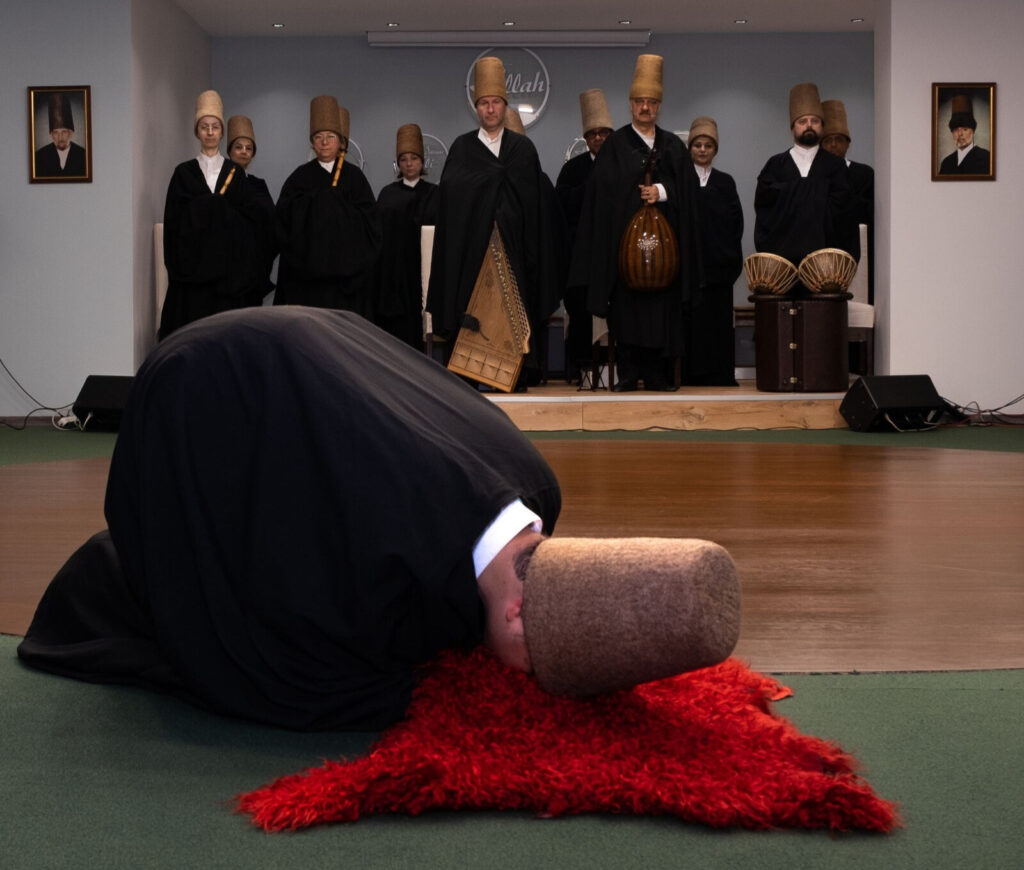
Mevlana was a true man of the heart within whom love of life and marvelous Divine Love were kneaded with the spirit of i mmortality and offered as an elixir to the generations after himself. People found relief for their sorrows in him; they sought goodness and truth in his words. He became Faith and Love. He was revived in death, in existence became non-existent. Even while together he was filled with longing, flying in time to timelessness.
The love of Mevlana’ s was as cool as a morning breeze, sublime enough to be a friend to those hearts separated from their love.
To Mevlana the most important duty of humans is their finding their identity and becoming aware of the Truth of God. While saying that this is only in this way we can be worthy of the title ” human” , Mevlana asks, ” If you haven ‘t found, haven’t seen the Beloved, why aren’ t you searching? If you have found the Beloved, why aren’t you exhilarated?”
Mevlana gives extraordinary value to man’ s free will and exalts the human being to virtually the level of a sacred being. So he gives special importance to a person’s knowing him or herself. With no discrimina tion based on differences of birth or later acquired differences, he values all humanity. He sees even the worst person as worthy of forgiveness and love. He makes known the heights to which Divine Love can elevate man. He explains that by always being mild mannered one can conquer hearts, and says,”Know that whoever you are, it is necessary to ask about the health and condition of everybody in your surroundings without discrimination. Even if a person is an enemy it is good to be kind, because with kindness one can make a friend. Even if he doesn’ t become a friend, his enmity will be reduced, because being kind is like a salve to enmity.”
With the torch of broad tolerance, joy and hope, which he represented, Mevlana held forth a light not only in his own time but for all ages to come. In every age his ideas are fresh, new and in the vanguard. He is able to see sins and faults with the kind forgiveness of God.
Mevlana called humans to unity, to give up themselves in the Unity of God. Mevlana is a great person who was against any institution or way of thought which held women as inferior or was not based on human sensitivity.
Mevlana is the King of Hearts, with no discrimination betwwn men and women or rich and poor. He won the love and friendship of women, and to elevate them he specifically held chats and meetings with them. This sublime King of Hearts looked not at people’s outer appearance but at their essence; and tried to direct them toward the real and illuminate them with the Light of Divine Truth.
In his Legends of the Saints( Ariflerin Menkebileri) Ahmet Eflaki Dede tells this:
Every Friday evening all the women of Konya used to get together with the wife of Emuniddin Mikail, a minister of the sultan, and they would beg her to call Me vlana. Then they would wait calmly for him to come. After his evening worship Mevlana would come by himself and join them. The women would form a circle around that great saint and sprinkle rose petals upon him. The Exalted Mevlana would stay with the m until early morning, offering words of spiritual advice and wisdom, and sharing Divine mysteries. Then there would be the Sema accompanied by the sound of the reed flute and the singing of women musicians.
The Exalted Mevlana’s greatest characterist ic was his lovingly approaching people of every class, revealing their own essence to them, and by intoxicating them with the delights of God, urging them toward the right path. In Ariflerin Menkebileri there is this example:
“There was a beautiful woman at the Sahi Isfahane han (a sort of hotel/temporary lodging place). She was gratifying the carnal desires of men, behaving against the mores of society. One day the Exalted Mevlana was passing in front of the han. This woman came running out of the bui lding and threw herself at Mevlana’s feet. With much pleading and crying she paid her respects to him.
That great man called out three times, ” Rabia…Rabia…Rabia…” (Rabia: the name of a famous sufi woman saint)
The other girls heard this and also ran out and threw themselves at Mevlana’s feet. At this he said, ” What great heroes! What great heroes! Who could have overcome this much lust and carnal desire. How would the chastity and honor of chaste and honorable women have been understood?”
One of the influential people of the time, on hearing these words, said, ” For a great man like Mevlana to take an interest in these women of the brothel and to treat them with courtesy is absurd.”
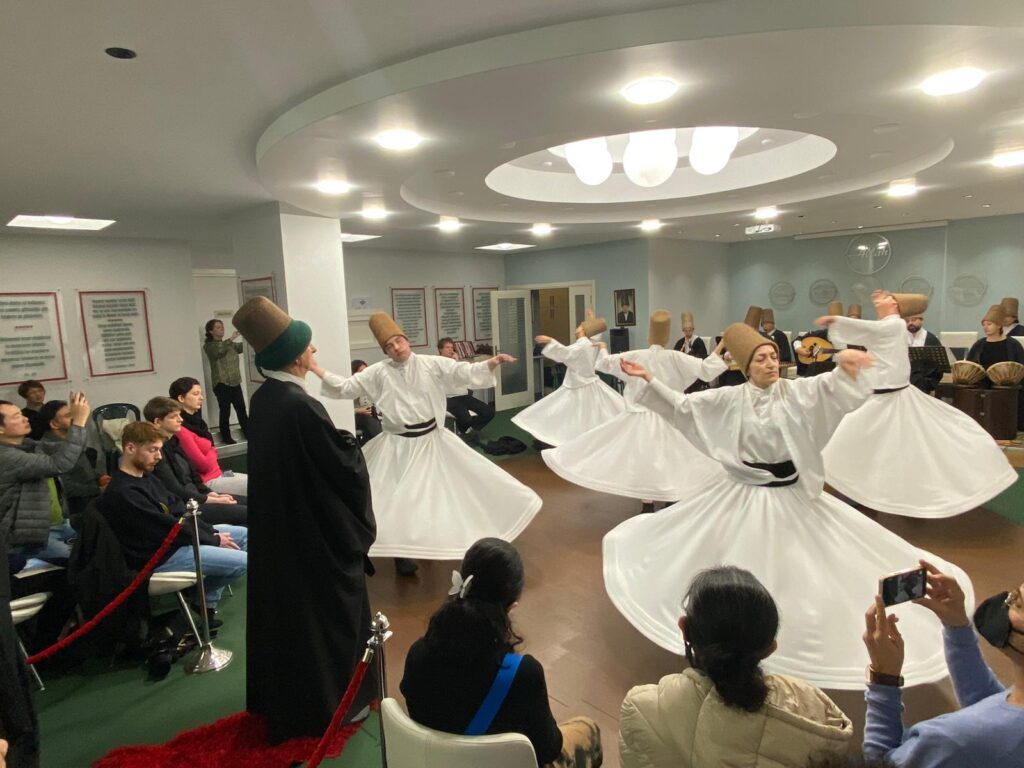
When Mevlana heard this he responded thus: This woman is behaving as she is and appearing as she is, with no hypocrisy. If you’re a man, be like her, quit this two -facedness so your inner and outer selves can be one. If your inner and outer selves aren’ t one, what you do is in vain, a waste.” In the end the woman repent ed like Rabia and freed the girls under her. They took their place among the women of the other world, became disciples of the Exalted Mevlana and were of great service.
Looking on love of people, respect for women as necessary essentials or even a ru le of Islam, the Exalted Mevlana behaved with the same delicacy and refinement towards his wife, daughters, daughter-in-laws, and spiritual daughters. He always based his judgment on love and fairness.
One day Mevlana’ s daughter the Lady Melike was scolding her serving woman. The exalted Mevlana came in and asked, ” Why are you scolding her and hurting her feelings? I wonder what you would have done if she were the lady and you the servant. How would you like it if I were to make a proclamation that n o one besides God shall have a slave or servant? In reality they are all our brothers and sisters.”
Because the Great Mevlana was in the presence of the inspiration of God he became the property of the whole world. With no regard for religion, sect, nationality or race he loved all people and taught them to love.
While the Exalted Mevlana brought this invitation he showed a unique patience and refinement; with no discrimination he offered tolerance and love to all creation through the beautiful characteristics of God which he possessed. whirling dervish ceremony istanbul, Dervishes Istanbul
Known to the west as Whirling Dervishes, the Mevlevi Order was founded by Mevlana Rumi in the 13th century. The Order wrote of tolerance, forgiveness, and enlightenment. They survive today as a cultural brotherhood. They are not theatrical spectacles but sacred rituals. The ritual of the Mevlevi sect, known as the sema, is a serious religious ritual performed by Muslim priests in a prayer trance to Allah. You can make your booking from our cart online !

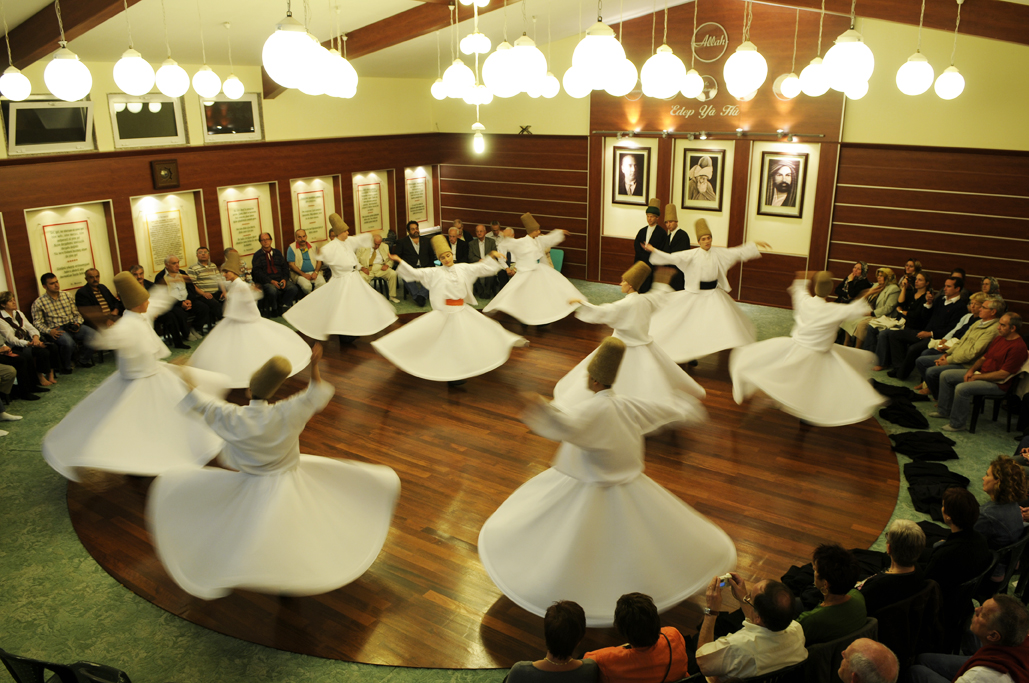
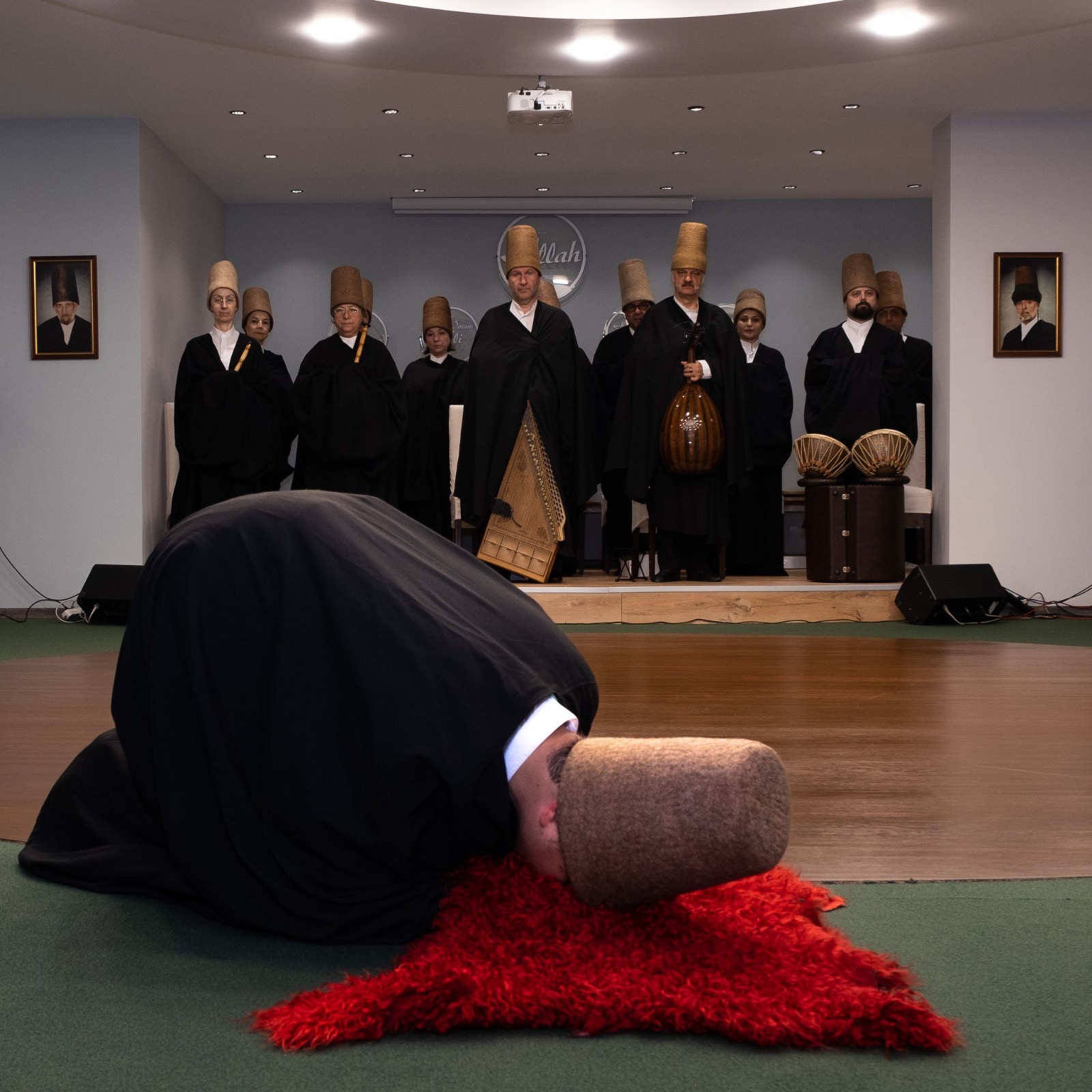
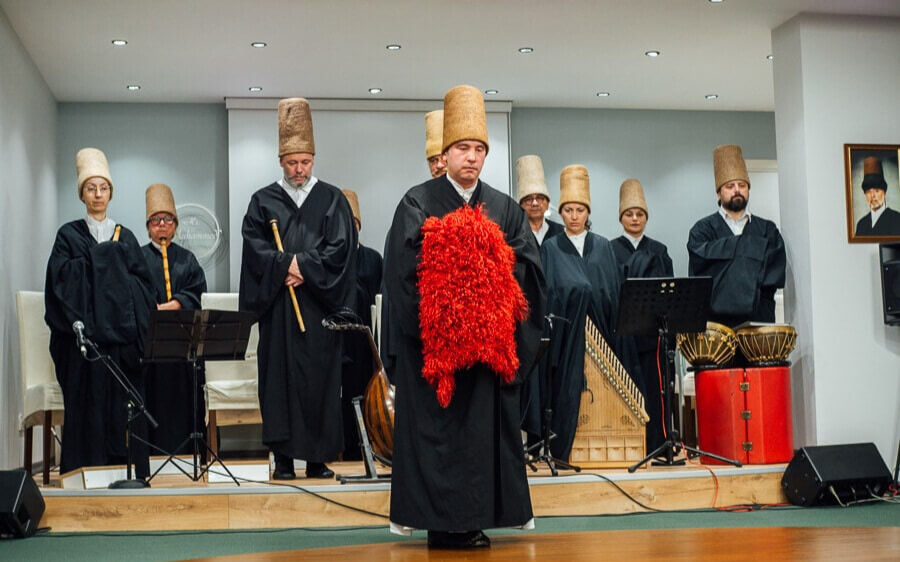



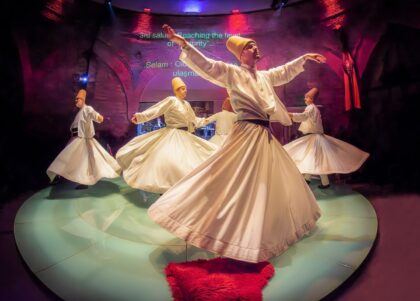
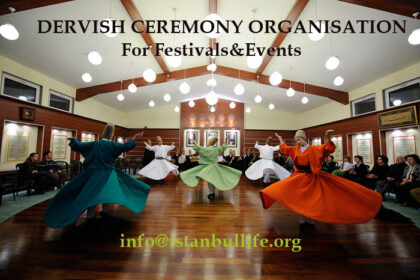
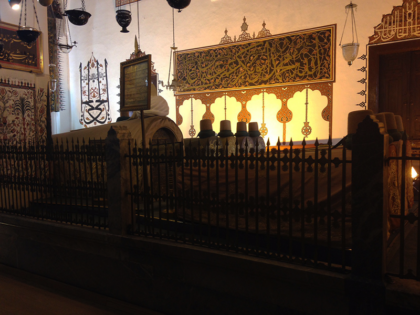
Reviews
There are no reviews yet.